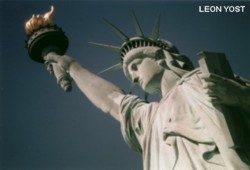 |  |  |
|
| ||
 |  |  |
 |  |  |
|
| ||
 |  |  |
|
|
Originally appeared as an editorial in the New York Times of Thursday, April 19, 2001,
For at least two decades New Jersey has struggled to shed its old identity of
aging factories, polluted marshlands and suspicious political deals. To a large
degree, it has succeeded. But recently the state has seemed to slide into new
ethical problems surrounding its three principal statewide officeholders and an
associate justice of its Supreme Court. Once again the state has become the
focus of criticism and scrutiny by investigators -- a reminder that New Jersey
residents must remain vigilant in demanding high ethical standards from their
elected and appointed leaders.
This week the focus has been on the most senior elected official in each of
the major parties. The state's acting governor, Donald DiFrancesco, a
Republican, has been ensnared in questions about his past financial practices as
a state legislator and as attorney for the township of Scotch Plains. The Times
disclosed on Tuesday that two special counsels for the township, one Republican
and one Democrat, concluded in 1998 that he had violated legal-ethics rules and
should be removed from his job. They found that Mr. DiFrancesco had lobbied
township officials for a zoning change that benefited his family without
disclosing his own financial stake; ruled on projects involving a home builder
shortly after receiving $225,000 from that builder; and influenced town
officials to drop plans for a soccer field on land his relatives hoped to
develop.
Mr. DiFrancesco became acting governor after Christie Whitman resigned to
become the Bush administration's environmental protection administrator. As his
problems have mounted, so have Democratic hopes for retaking the State House
this year. Mr. DiFrancesco has denied any improprieties, but he has come under
pressure within his own party to drop his gubernatorial candidacy.
The state's senior Democrat, Senator Robert Torricelli, is also plagued by
ethical questions and investigations into his campaign fund-raising, business
dealings and personal finances. A former political supporter has reportedly
accused him of accepting tens of thousands of dollars in cash and expensive
gifts, far more than allowed under federal law and the Senate's ethics rules.
The senator has denied any impropriety and angrily charged that federal
prosecutors are out to discredit him. His supporters suggest dark political
vindictiveness by the Bush administration.
Two other top officials, one from each party, have faced ethical criticism.
Associate Justice Peter G. Verniero of the Supreme Court, a Republican, has come
under heavy attack from the State Senate for his passive role in investigating
cases of racial profiling while he was attorney general several years ago and
for his apparent lack of candor in testifying about it during his confirmation
hearings and more recently. He has been urged to resign from the high court by
Mr. DiFrancesco, some legislative leaders and this page, among others.
Earlier, the state's junior senator, Jon Corzine, a Democrat, was criticized
by this page and by others for his decision to continue holding large numbers of
shares at Goldman Sachs, which he once headed, while serving on the Senate
Banking Committee. That poses a clear conflict of interest, although he is in
compliance with the Senate's lax ethics rules.
In none of these cases has anyone yet been charged with crimes. But what is
troubling is a pattern of behavior that suggests New Jersey may be backsliding
from its earlier successes in moving toward more open and responsible
government. Two years ago the Almanac of American Politics declared that "New
Jersey, once corrupt, is now pretty well cleaned up." But if recent events have
proven anything, this is no time for complacency.
 Your Ancestors' Story |
 Bruce Springsteen's Jersey Shore Rock Haven! |

|
UrbanTimes.com |